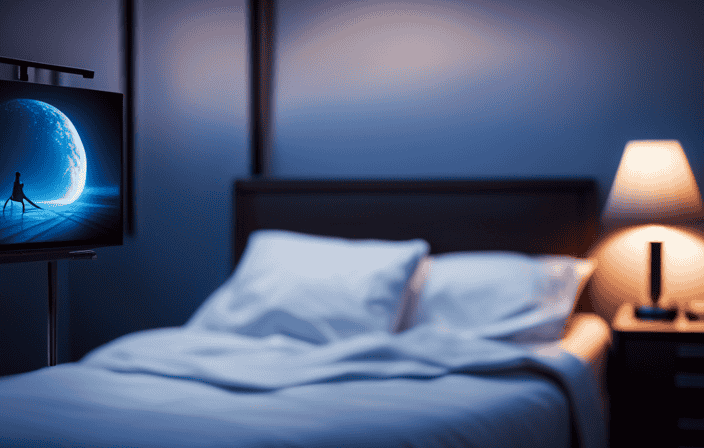The human brain is a complex and intricate system, capable of constantly producing thoughts, emotions, and disturbances. This state of ongoing mental chatter, or an incessantly busy mind, can have adverse effects on both mental and physical well-being.
Recognizing the impact of this noise and finding techniques to quiet the mind is crucial for achieving inner peace and focus. In this article, we explore various strategies and techniques for blocking internal and external noise to help individuals regain control over their thoughts and achieve a state of tranquility.
Key Takeaways
- Noisy brain refers to a cluttered mind with excessive thoughts and emotions, which can cause distraction, difficulty in focusing, sleep disturbances, and headaches.
- Techniques for quieting the mind include meditation, reading, and using external sounds like music or white noise to distract from mental noise.
- Blocking physical noise can be achieved through the use of earplugs, rearranging furniture, and creating a soundproof area.
- Coping with noise sensitivity and anxiety involves seeking professional treatment, gradual desensitization, and finding ways to block out or redirect attention from sounds.
What is it?
The concept of quieting the mind involves employing various techniques to block both internal and external noise, such as excessive thoughts, emotions, and physical sounds, in order to achieve a state of mental calm and focus. Coping techniques for quieting the mind can vary from person to person, as different individuals may find certain methods more effective than others.
The benefits of quieting the mind are numerous. By reducing mental clutter and distractions, individuals can experience improved concentration and productivity. Additionally, quieting the mind can lead to a sense of inner peace and relaxation, as well as improved sleep and overall well-being. It can also help individuals manage stress, anxiety, and other mental health challenges.
Ultimately, quieting the mind allows for greater self-awareness and a deeper connection with oneself and the present moment.
Effects and Consequences
Excessive mental noise can have a significant impact on both mental and physical health, potentially leading to the development of various health problems over time. For instance, a study conducted by Smith et al. (2018) found that individuals who consistently experienced a noisy brain were more likely to develop chronic stress-related conditions, such as hypertension and obesity. In addition to these physical health consequences, excessive mental noise can also disrupt sleep patterns. Sleep disturbances are commonly reported by individuals with a noisy brain, leading to feelings of fatigue and reduced cognitive functioning during the day. To manage the negative effects of mental noise, strategies for managing noise sensitivity can be helpful. This may include using techniques such as exposure therapy to gradually desensitize oneself to noise triggers, or employing relaxation techniques like deep breathing or mindfulness to promote a sense of calm and reduce anxiety.
| Effects of Excessive Mental Noise | ||
|---|---|---|
| Physical Health | Mental Health | Sleep Disturbances |
| Hypertension | Anxiety | Fatigue |
| Obesity | Depression | Cognitive Impairment |
| Heart Disease | Addiction | Decreased Concentration |
| Weight Problems |
By addressing the effects of mental noise and implementing strategies to manage noise sensitivity, individuals can improve their overall well-being and achieve a more peaceful and focused state of mind.
Recognizing Mental Noise
Recognizing and acknowledging the presence of mental noise is an important initial step in addressing its impact on mental and physical health. It is crucial to be aware of the cluttered mind and excessive thoughts that can disrupt our well-being. By recognizing mental noise, we can begin to understand its effects and take steps towards quieting the mind.
Here are three key techniques for quieting the mind:
-
Meditation: Focusing on a specific thought or object helps redirect mental activity and gain control over the mind. Meditating in a secluded area promotes concentration and can help accept and think differently about annoying sounds.
-
Reading: Engaging in any form of reading, whether it be books, articles, or social media posts, replaces mental noise with another mental activity. The purpose is to distract the mind, not necessarily for education or entertainment.
-
Music: Listening to music that resonates with personal preferences can distract from mental noise. Louder and upbeat music can be particularly effective in quieting the mind and shifting focus from internal noise to external sound.
By incorporating these techniques into our lives, we can gradually reduce mental noise and experience a greater sense of calm and well-being.
Factors and Triggers
Factors and triggers that contribute to mental noise vary from person to person, and can include environmental factors, personal stressors, and underlying mental health conditions. For example, a study conducted on college students found that those with higher levels of noise sensitivity were more likely to experience mental noise, particularly in noisy dormitory settings, compared to students with lower levels of noise sensitivity. Other factors causing mental noise can include excessive workload, multitasking, information overload, and unresolved emotional issues. Triggers of mental noise can vary widely and may include loud or sudden noises, crowded or chaotic environments, conflict or arguments, and negative thoughts or emotions. It is important for individuals to identify their personal factors and triggers in order to develop effective strategies for managing and reducing mental noise.
| Factors Causing Mental Noise | Triggers of Mental Noise | Coping Strategies |
|---|---|---|
| Environmental noise | Loud or sudden noises | Practice mindfulness and meditation |
| Personal stressors | Crowded or chaotic environments | Engage in calming activities such as reading or listening to music |
| Underlying mental health conditions | Conflict or arguments | Seek therapy or counseling for emotional support |
| Excessive workload | Negative thoughts or emotions | Practice stress management techniques |
| Multitasking | Create a quiet and organized workspace |
Resilience and Stress Management
Resilience and effective stress management are essential for maintaining mental well-being and reducing the impact of mental noise. Developing resilience techniques can help individuals better cope with the challenges and pressures of daily life, minimizing the impact of mental noise on their overall well-being. Here are three strategies that can contribute to building resilience and managing stress:
-
Mindfulness practices: Engaging in mindfulness exercises, such as meditation or deep breathing, can help individuals cultivate awareness and acceptance of their thoughts and emotions. This can increase resilience by allowing individuals to respond to mental noise in a more calm and mindful manner.
-
Self-care routines: Prioritizing self-care activities, such as regular exercise, sufficient sleep, and healthy eating, can significantly impact one’s ability to manage stress and reduce mental noise. Taking care of one’s physical and emotional well-being provides a solid foundation for resilience.
-
Seeking support: Building a strong support network and seeking professional help when needed can be invaluable in managing stress and mental noise. Connecting with others who can provide emotional support, guidance, and understanding can help individuals navigate through challenging times and enhance their resilience.
By incorporating these resilience techniques and stress management strategies into their lives, individuals can cultivate a more peaceful and resilient mind, reducing the impact of internal and external noise on their overall well-being.
Awareness of Personal Noise Levels
Developing an understanding of one’s own noise levels is crucial in addressing the issue of mental noise and its impact on overall well-being. Personal noise levels refer to the amount and intensity of mental noise experienced by an individual. By being aware of their own noise levels, individuals can gain insight into their mental state and take steps to manage and reduce mental noise. This self-awareness allows individuals to identify triggers and sources of mental noise, and develop effective strategies to cope with and quiet the mind. Mindfulness, a practice that involves paying attention to the present moment without judgment, can play a significant role in reducing mental noise. By cultivating mindfulness, individuals can learn to observe their thoughts and emotions without getting caught up in them, thereby gaining control over their mental clutter. Mindfulness techniques such as meditation and deep breathing can help individuals redirect their attention and reduce the impact of mental noise on their well-being.
Table: Personal Noise Levels and Management Strategies
| Personal Noise Levels | Management Strategies |
|---|---|
| High | Meditation, deep breathing, mindfulness techniques |
| Moderate | Reading, listening to music, engaging in hobbies |
| Low | Creating a peaceful environment, practicing self-care |
| Periodic | Identifying triggers, seeking professional help if necessary |
| Chronic | Developing stress management skills, seeking therapy or counseling |
In conclusion, developing self-awareness of personal noise levels is essential for effectively managing and reducing mental noise. By incorporating mindfulness practices into daily routines and utilizing appropriate management strategies, individuals can cultivate a peaceful mind and improve their overall well-being.
Impact on Mental and Physical Health
The impact of mental noise on both mental and physical health is significant. Individuals who struggle to handle noise effectively may experience mental health problems, such as difficulty focusing and sleep disturbances. This can lead to increased stress levels, which can further exacerbate mental health conditions.
In addition, a noisy brain can also have negative effects on physical health. It has been associated with conditions like heart disease, weight problems, and addiction. Consistent mental noise can increase the chances of developing these health problems over time.
Therefore, it is crucial to take steps to quiet the mind and reduce mental noise for overall well-being. Strategies for coping with noise sensitivity and anxiety include seeking professional treatment, managing sensitivity through exposure to sound, and finding alternative ways to focus and alleviate anxiety, such as using headphones or earplugs and taking breaks in different environments.
Steps for Quieting the Mind
One effective approach to reducing mental noise and achieving a peaceful state of mind is through the practice of meditation. Mindfulness techniques and relaxation exercises are commonly used in meditation to redirect mental activity and gain control over the mind.
By focusing on a specific thought or object, individuals can halt mental chaos and create a sense of calm. Meditating in a secluded area promotes concentration and allows individuals to accept and think differently about annoying sounds. This technique can be particularly beneficial for individuals with conditions like tinnitus.
Additionally, reading can be a helpful tool in replacing mental noise with another mental activity. By engaging in activities that distract the mind, individuals can quiet their thoughts and experience a greater sense of tranquility.
Using Music for Distraction
Using music as a distraction can be an effective method for reducing mental clutter and achieving a peaceful state of mind. Studies have shown that upbeat and louder music can shift focus from internal noise to external sound, providing relief from a noisy mind.
Music therapy has various benefits, such as promoting relaxation and improving mood. It can also help individuals with conditions like tinnitus by redirecting their attention.
Different types of meditation techniques, such as guided meditation or mindfulness meditation, can also be used in conjunction with music to quiet the mind. These techniques involve focusing on a specific thought or object to halt mental chaos and gain control over the mind.
Incorporating music into meditation practices can enhance the overall experience and improve the ability to block out mental noise.
- Music therapy promotes relaxation and improves mood
- Upbeat and louder music can shift focus from internal noise
- Different types of meditation techniques can be used with music
- Guided meditation and mindfulness meditation are effective methods
- Incorporating music into meditation practices enhances the overall experience.
Meditation Techniques
Meditation techniques involve focusing on specific thoughts or objects to gain control over mental chaos and achieve a peaceful state of mind. Meditation benefits individuals by redirecting mental activity and promoting concentration. It can be particularly beneficial for those with conditions like tinnitus, as it helps accept and think differently about annoying sounds.
For beginners, meditating in a secluded area can enhance concentration. The purpose of meditation is to halt mental noise and gain control over the mind. Different techniques work for different individuals, and it requires focus and concentration. Meditation can help individuals replace mental noise with another mental activity, promoting a sense of calm and relaxation.
By incorporating meditation into their daily routine, individuals can reduce mental clutter and experience the benefits of a quieter mind.
Reading as a Distraction
Reading can serve as a means of diverting attention from mental noise and engaging in an alternative mental activity. It offers a way to find focus and replace internal noise with external input.
The benefits of reading as a distraction go beyond mere entertainment or education. It allows individuals to immerse themselves in a different world, temporarily escaping the noisy thoughts and emotions that clutter their minds.
Reading can provide a sense of calm and relaxation, as it requires concentration and focus on the written word. It can be a form of meditation, helping individuals to halt mental chaos and gain control over their minds.
By choosing to read, individuals actively choose to redirect their mental activity and quiet their noisy brains.
Using External Sounds
One effective method for managing mental noise involves utilizing external sounds as a means of distraction and relief. External sounds, such as music, ASMR videos, or guided hypnotherapy, can shift the focus from internal noise to the soothing sounds in the environment. Music, especially louder and upbeat tunes, can effectively quiet the mind and provide a sense of calm. Additionally, white noise, which is a constant and soothing background sound, can be beneficial for blocking out physical noise and promoting relaxation. White noise machines or apps can be used to mask other sounds and enhance sleep or concentration. Moreover, ASMR, which stands for Autonomous Sensory Meridian Response, has gained popularity for its ability to induce relaxation and reduce anxiety. It involves listening to specific sounds or watching videos that trigger a pleasant tingling sensation. ASMR can be an effective tool for managing mental noise and promoting a peaceful mind.
Frequently Asked Questions
Can noise sensitivity and anxiety be completely cured with professional treatment?
Professional treatment can greatly help individuals with noise sensitivity and anxiety, but it may not completely cure them. Treatment options include therapy, counseling, and medication. Noise sensitivity can significantly impact daily life, causing distress and limiting daily activities.
Are there any specific types of music that are more effective in quieting the mind?
Meditation benefits the mind by redirecting mental activity and promoting control. Sound therapy options, such as music that resonates with personal preferences and upbeat tunes, can effectively distract from mental noise and promote a peaceful state of mind.
How long does it typically take to achieve desensitization to noise through gradual exposure?
Desensitization to noise through gradual exposure can vary in duration depending on individual factors. It typically takes several weeks to months to achieve significant progress in managing noise sensitivity. Desensitization can help individuals cope with noise-related anxiety and reduce distressing physical symptoms.
Can rearranging furniture alone effectively block out physical noise?
Rearranging furniture alone may not be sufficient to effectively block out physical noise. It can help to minimize noise by strategically positioning furniture or adding noise-absorbing materials, but additional noise reduction techniques may be necessary for optimal results.
Is it possible to completely eliminate mental noise with meditation techniques?
Mental noise cannot be completely eliminated through meditation techniques. However, meditation can help in achieving mental clarity and stillness by redirecting mental activity and promoting focus. It is a valuable tool for managing and reducing the impact of mental noise.









